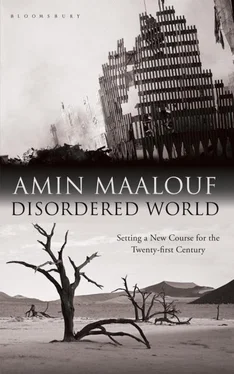I agree that would be absurd and it is certainly not what I would advocate. What other solution is there? At this moment, I can see none. But the fact that there is no realistic solution does not mean that the problem does not exist. I am convinced that it is entirely real and is already having devastating effects, and that its seriousness will become more and more apparent in the coming decades.
I shall explain my reasons for these concerns in what follows. First I would like to deal with another possible objection. If the first was the perennial ‘What’s the point?’, the second is the no less enduring ‘It has always been thus!’
Since the dawn of history, it will be objected, some nations have imposed their will on others: the powerful decide; the oppressed submit. For generations, the vote of someone in New York, Paris or London has counted for more than that of a voter in Beirut, La Paz, Manila or Kampala. If the present day has brought changes, they have tended to be in a positive direction, since hundreds of millions of people who have previously been muzzled can now express themselves freely; this is notably the case throughout most of Latin America and Eastern Europe, and in some African and Asian countries such as the Philippines and Indonesia.
That may be so, but it is deceptive nonetheless. Past empires may have been vast and powerful, but their grip on the world remained weak because their weapons and means of communication did not allow them to maintain effective control far from the centre, and also because they all had to contend with rival powers.
Today, extraordinary technological advances have made possible much tighter control of the globe and contributed to the concentration of political power in a small number of capitals, and in one in particular. This explains the emergence for the first time in history of a government whose ‘jurisdiction’ covers the whole planet.
This unprecedented situation naturally generates equally unprecedented disparities as well as new balances — or rather imbalances. And suicidal resentment.
Clearly something has changed radically in the fabric of the world, something that has profoundly damaged relations between people, diminished the significance of democracy and blurred the path of progress.
If we want to examine this change more closely to try to understand its origins and mechanisms and to grope our way out of the deadly labyrinth, the concept which might serve as a beacon is that of legitimacy. In some people’s eyes today, it is a concept which is outdated, forgotten and even somewhat suspect, but it is indispensable to any discussion of the question of power.
Legitimacy is what enables people to accept, without excessive constraint, the authority of an institution, represented by individuals and embodying shared values.
That is a broad definition capable of embracing very different situations: a child’s relationship with its parents, an activist’s with the leaders of his party or his union, a citizen’s with his government, an employee or a shareholder’s with the directors of a company, a student’s with his professors, a believer’s with the leaders of his religious community, and so on. Some forms of legitimacy are more stable than others, but none of them is immutable; legitimacy can be won and lost according to one’s talent or to circumstances.
The whole history of human societies can even be told from the viewpoint of crises in legitimacy. Following dramatic change, a new source of legitimacy emerges which replaces the one that has just collapsed. But how long that new legitimacy lasts depends upon its successes. If it disappoints, it will begin to fail fairly quickly, sometimes even before its supporters realise it.
For example, at what point did the tsars stop appearing legitimate? And how many decades did it take for the credit of the October Revolution to run out in its turn? In recent times, Russia has been the scene of a spectacular loss of legitimacy which has had worldwide repercussions. But it is just one case among many. Legitimacy only appears unchanging; whether it belongs to a man, a dynasty, a revolution or a national movement, there comes a point at which it no longer works. It is at that point that one power replaces another, and a new legitimacy replaces the discredited one.
For the world to function reasonably harmoniously and without major disturbances, most people should have legitimate leaders in charge; they in turn would be answerable to a global authority which is itself regarded as legitimate.
Clearly that is not the case today. In fact it is almost the opposite: many of our fellow human beings live in states whose rulers are not the winners in fair elections, nor inheritors of a respected dynasty, nor continuing a successful revolution, nor architects of an economic miracle, and therefore do not have any legitimacy. And they live under the control of a global power whose legitimacy people do not recognise either. This is particularly the case for the vast majority of Arab nations. Is it a coincidence that this is where the men who committed the most spectacular acts of violence at the start of this century came from?
Questions of legitimacy have always played a major part in the history of the Muslim world. The most significant example is probably that of religious factionalism. While in Christianity there have been constant divisions — and sometimes massacres — over the nature of Christ, the Trinity, the Immaculate Conception and the form of prayers, the conflicts in Islam have usually centred on quarrels over succession.
The major schism between Sunnis and Shi’ites did not come about for theological reasons but for dynastic ones. At the death of the Prophet, a group of the faithful declared their support for his young cousin and son-in-law, Ali. Ali possessed a brilliant mind and had many unconditional supporters who were called ‘shi-’a-Ali’, the party of Ali, or simply ‘shi’a’. But he also had many critics, who succeeded on three occasions in having representatives from the opposing party named ‘caliph’ or ‘successor’. When Ali was finally chosen as the fourth caliph, his enemies rose against him immediately and he was never able to reign peacefully. He was assassinated four and a half years later. Then his son Hussein was killed at the battle of Karbala in 680 CE an event still commemorated with great fervour by Shi’ites. Many of them hope that a descendant of Ali will soon appear among them: an imam hidden from us today who will return power to its rightful owners. This belief is held with a messianic zeal which the passing centuries have not diminished.
Onto this dynastic quarrel have been grafted — as was the case with the theological quarrels of Christians — considerations of a different order. When Rome condemned as heresy the beliefs of the patriarch in Alexandria or Constantinople, when Henry VIII of England broke with the Catholic Church or a German prince supported Luther, there were often political considerations and even commercial rivalries — conscious or otherwise — which played a hidden role. In the same way, the tenets of Shi’ism have often been adopted by peoples who wanted to mark their opposition to the powers that be. In the sixteenth century, for example, when the Ottoman empire, which was implacably Sunni, was enjoying its greatest expansion and claimed to unite the majority of Muslims under its authority, the Shah of Persia transformed his kingdom into a bastion of Shi’ism. It was a way for him to preserve his empire and for his Persian-speaking subjects to avoid living under the domination of a Turkish-speaking people. But just as the king of England showed his independence by speaking of the Eucharist or Purgatory, so the Shah marked his difference in affirming his attachment to the family of the Prophet, as a guarantee of legitimacy.
Читать дальше












